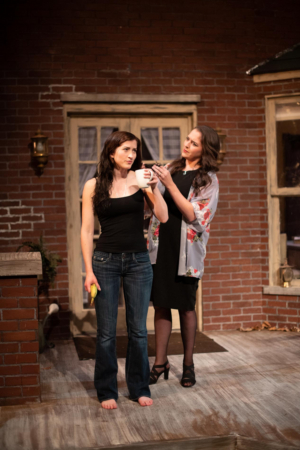Review: Evocative PROOF Touches Audiences Hearts at Lyric Arts

Photo Credit: Lyric Arts
Do descendants inherit any familial traits or do they assimilate them from their childhood environment? Lyric Arts poses a poignant production of David Auburn's 2000 multiple award winning play, Proof, that deftly tackles this question along with other relevant themes convening mental health. Through the story of Robert, a brilliant mathematician who achieved great fame in his field before age 25, and his two daughters, Catherine and Claire, the answers to the questions the play poses become more blurred than clear to the audience's benefit.
The heart of this Pulitzer Prize winning drama centers around mathematical "proofs," which can be defined as a convincing demonstration that a mathematical statement is true. Numerous mathematical proofs challenge everyday suppositions or the more obscure, such as dealing with imaginary or prime numbers. Robert established groundbreaking proofs in his relative youth, and afterwards slipped into a life of chronic mental incapacity. This subject resonates with both his younger and older daughters. The youngest, Catherine drops out of the university to care for her father Robert, while Claire works overtime to pay the bills and mortgage on their old university house. Each sacrifices a part of her life caring for their father.
Scenic Designer Mark Koski provides a cozy, realistic backdrop creating the plays' slightly dilapidated Chicago brownstone. With the backyard open to the audience, long grass scattered with golden fall leaves provide the setting for this provocative drama. Doors, lights and window shades offer clues to Robert appearing as a spirit to Catherine after his death, while Claire flies in from New York for her father's funeral. One of Robert's former PH.D. students, Hal Dobbs, hopes to peruse Robert's 100 plus notebooks he filled while suffering from his illness to discover, by chance, another groundbreaking mathematical proof. Hal also falls for Catherine and the romance offers a ray of hope for the grieving Catherine.
Director Matt McNabb portrays these fragile characters with poignancy, and highlights the humor throughout the script as well. Catherine, played by Tara Schaefle, discovers a precarious, tenuous balance between anger and grief's uncertainty--a challenging role for the two hour plus production. Kate Beahen adds a sparkling dimension to sister Claire, who can neither soothe nor assist her sister in this transition after her father's death without inciting Catherine's sibling rivalry.
While Claire is talented mathematically, Catherine supposedly inherited Robert's genius. Playing the outlier Hal, Mike Swan provides a steadfast and lighthearted counterpart to each women's grief. Charming, without meaning to appear like a predator for Robert's could be valuable mathematical notebooks, most of the scribblings were written after Robert's illness began. This illness haunts Catherine, too, and she wonders, as does Claire, how fragile she might be- succumbing to her father's illness in the future. Will Catherine, too, inherit her father's mental instability?
Called to play the interesting role of Robert, Warren Sampson grapples his fatherly love with aplomb through only a few scenes. Robert carries hopes for each of his children, and realizes Catherine might carry on his legacy. Parents often hope their own children might transform the world, either through their personal heritage or for the general good. Perhaps one of his own quotes to Catherine summarizes his personal parenting, and other parents' thoughts: "You hope your children survive you, [and accomplish what eluded you] or what you couldn't do."
The play's evocative story details the challenges caregiving someone who's mentally incapacitated and was formerly brilliant. Schafele's Catherine reiterates how she calmed her father for years, helping him stay home instead of being institutionalized. Perhaps Catherine's insights offer clues to the audience on how mental health concerns might be addressed today. Claire provides the opposite side of these concerns in paying for help and services, while maintaining the integrity of those who take care of the person needing assistance. These insights might be helpful, stimulating further questions, as the country's population ages. Another phenomena has occurred in America over the last ten years- depression and suicide has increased significantly in college age students, and those under thirty-which resonates with these themes, too.
Both sisters, and then outlier Hal, question how much Hal needs to help or influence the outcome of these lives after Robert dies. A mystery appears in the second act that surprisingly determines what the family legacy will be.. Take the opportunity to attend this award winning production and determine for yourself what someone else would do or has done in these caregiving or mental health situations. While this heart-rending play dares to address these culturally current concerns, perhaps Lyric Arts's poignant Proof provides it's own evidence, a proof in itself, that these complex cultural shifts experienced in our society need immediate attention.
Lyric Arts presents PROOF at Anoka's Main Stage Theater through November 3. For information on the 2019-2020 season, or the current performance, please visit: www.lyricarts.org.
Reader Reviews

Videos

